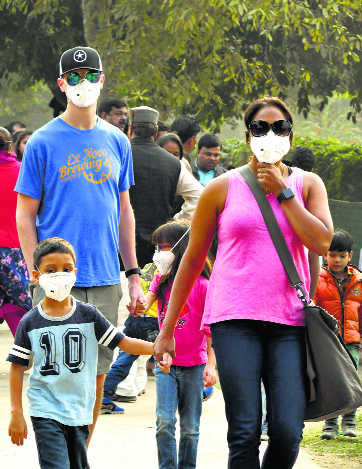
Visitors wear masks to protect themselves from smog at India Gate in New Delhi on Sunday. Tribune photo: Manas Ranjan Bhui
Tribune News Service
New Delhi, December 10
In what could aid in the better management of respiratory patients, Vallabhbhai Patel Chest Institute has opened a pollen count station in the Capital, which is going to be Delhi-NCR’s first-ever such station to monitor levels of airborne grass pollen. Soon the Centre will start issuing advisory related to pollen count to help patients with respiratory disorders.
Many studies have found that not only the vehicular and industrial emissions, but pollen grains, fungal spores, dust mites, insect debris and animal epithelial are also amongst major contributors causing allergies, breathing problems and respiratory disorders.
Having a pollen count station can be instrumental, especially for people with asthma and other respiratory ailments, as they can check the forecast and take preventive measures, like taking anti-histamines or staying indoors and minimise health risk.
Experts say that for patients with respiratory troubles and asthmatics, the pollen count would be a key resource to help manage their symptoms and put in their health.
A recent study by the institute under Delhi University found that 30 per cent of the population is reportedly suffering from one or the other allergic ailment. To add majority is not even aware about what is flaring up their condition and ways to tackle.
As per the study, the maximum and minimum pollen counted for the year was in September (4805 pollens) and December, (1973 pollens), respectively. The pollen concentration starts increasing in September, October and November (282.65, 275.73, and 245.44 pollens/m3 /months) and started declining in December.
Noting that besides pollution, airborne pollens can also have a major impact on respiratory systems, says VPCI Director (Acting) Dr. Raj Kumar adding that while awareness about impact of pollution on health has increased, not much is being done dealing with pollens which adversely impacts the health of respiratory patients.
“Having a pollen count station can be crucial for such patients as they beforehand can check pollen count status in the vicinity and take necessary steps to avoid exposure,” adds Dr Raj, who is also the Head, Department of Pulmonary Medicine and National Center of Allergy Asthma and Immunology VP Chest Institute, Delhi University.



























